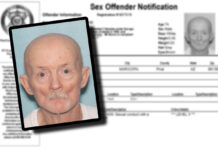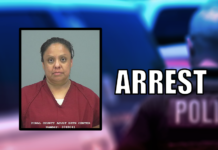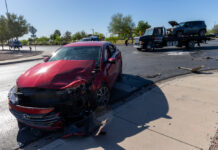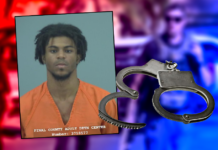Forced entry was not part of the majority of burglaries last month and Maricopa Police Chief Steve Stahl is calling on the public to be more aware.
On Saturday, He taught residents how to be good witnesses during his monthly Coffee with the Chief at Honeycutt Coffee. He outlined how to identify a criminal act, when to call the police and what questions the 911 dispatcher might ask.
“In the month of April, burglaries went on the increase,” Stahl said.
He said no forced entry was reported in about 90 percent of the burglaries, meaning the intruder found an open door or window.
“What that tells me is we’re not quite getting the message out there that you have to be aware of your surroundings,” he said. “You have to do what’s necessary to take care of your stuff.”
Stahl said residents who know how to be good witnesses are assets to the police department in solving cases.
“I need your help, I’m asking for your help,” Stahl said.
He said residents know what belongs and what doesn’t in their neighborhoods and know if something is out of place.
“I’m going to encourage you to be reporters and good witnesses,” he said.
As incentive, Stahl said there is a $50 cash reward for any citizen who provides information that leads to the arrest of anyone who committed a crime in Maricopa.
He said if the question of whether or not to call the police is raised, the answer is always: “Yes.”
“Let us determine if we’re needed or if we’re not needed,” he said.
Stahl said there are three types of crimes: Crimes about to occur, crimes in progress and crimes that already have occurred. He said citizens should call 911 for crimes in progress and 520-568-3673, the nonemergency number, for the others categories.
“Often we get called after the crime already occurred,” Stahl said. “Certainly we would like to get to that first category, crimes that are about to occur. An educated neighborhood really helps us with crimes that are about to occur.”
Stahl said it’s a good idea to have neighbors’ contact information just in case they need to be reached.
When Stahl asked the group of more than 30 people how many of them have a phone tree or email tree that enables them to contact all of their neighbors even if they’re out of town, five people raised their hands.
“That’s not enough,” he said. “The more contact you have with your neighbors the better and safer your neighborhood is.”
Stahl said people should be on the lookout for suspicious behavior such as people looking into windows or trying doors, wearing warm clothing in the summertime, wearing a hat and sunglasses inside, screaming, stumbling down the street or driving slowly by parks or other places where children gather.
He said dispatchers will ask the following questions:
• Was it a male or female?
• About how old?
• Height?
• Weight?
• What skin color?
• What hair color?
• What hairstyle?
• Were they wearing glasses or sunglasses?
• Any tattoos, scars or birthmarks?
• What direction did they go?



![Alleged car thief released without charges Phoenix police stop a stolen vehicle on April 20, 2024. [Facebook]](https://www.inmaricopa.com/wp-content/uploads/2024/04/IMG_5040-218x150.jpg)











![Alleged car thief released without charges Phoenix police stop a stolen vehicle on April 20, 2024. [Facebook]](https://www.inmaricopa.com/wp-content/uploads/2024/04/IMG_5040-100x70.jpg)
![Locals find zen with Earth Day drum circle Lizz Fiedorczyk instructs a drum circle at Maricopa Community Center April 22, 2024. [Brian Petersheim Jr.]](https://www.inmaricopa.com/wp-content/uploads/2024/04/PJ_3922-Enhanced-NR-100x70.jpg)
